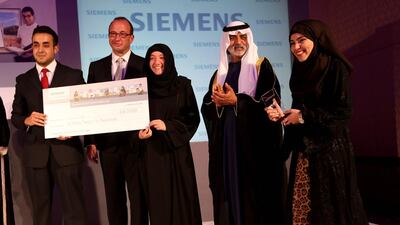ABU DHABI // All it took was a “very hot idea” and some cool clay for a team of University of Sharjah students to walk away with a US$25,000 (Dh92,000) prize.
Team Cool Clay – Emirati Fatima AlMadhloum, Majid Abuabdoun from Jordan and Camilia Aokal from Canada – beat 78 teams from 120 universities across the Middle East to win the second annual Siemens Student Award Competition.
The competition awards students who create inventions to tackle challenges in cooling, solar panel cleaning, imaging rooms in developing countries and electricity demand.
“We’re amazed, we’re happy, we’re still shaking,” said 19-year-old Fatima, who is studying sustainable and renewable energy engineering. “We’re going to think of better ways to enhance our project with Siemens, they want to help us enhance it and we’re going to learn from them also. We’re hoping for the best,” she said, thanking the team’s mentor, Professor Dr Abdulhai Alami.
The students’ winning project offers an environmentally-friendly and cost-efficient alternative to traditional air conditioning using solar panels, water and porous synthetic clay.
The project proposes constructing a building, using any materials, and placing a solar panel on the roof. The students, working with a small-scale model, placed clay on the shaded side of the solar panel. Using a software application, water was distributed onto the clay, according to the students’ demands.
“The simple idea is you only have to spray water on the clay and you leave it for a few minutes and it will cool down and the cooled air will go to the box, which resembles the building or whatever you want to cool down,” said Fatima, referring to the model used in the experiment. “We had really fantastic readings. We implemented the clay on photovoltaic [solar] panels and we have before clay it was 90ºC and after it was 45ºC.”
Presenting the award to the team, juror Javed Jabbar, chairman and chief executive of JJ Media, called the students’ project a “very hot idea”.
“They brought together humanity, the earth and habitat in a very distinctive and innovative form,” said Mr Jabbar, one of five judges.
In his address to the 100 guests at the awards ceremony, Sheikh Nahyan bin Mubarak, the Minister of Culture, Youth and Community Development, called the students “smart, clever, ambitious, creative, innovative and persistent.
“You have demonstrated that you care about the sustainable development of our region,” he said.
The runner-up, the Hydrotech Cleaning Solutions team from New York University Abu Dhabi, took home US$10,000 for their invention, inspired by the Namib Desert beetle.
“This is a beetle with a water drop forming on the back,” said Mohamed Amine Belarbi, 20, from Morocco. “You can see this beetle, although it is present in the desert, a place where you wouldn’t even think of finding water, they can sustain themselves. How do they do that? It’s the unique composition of its back, which we tried to emulate.”
The students built a wiper-like device, shaped like the beetle, that can harvest water from humidity. The liquid is then stored and washed over solar panels every seven hours to keep them clean.
“The purpose, in this case, was to clean solar panels,” said Mohamed. “Everyone might think the Gulf region, with this enormous exposure to sun, they should be pioneers in the solar field. But that’s not the case because there’s huge problems with dust accumulation.”
Two other teams, one from King Edward Medical University in Pakistan and the other from the University of Sharjah, also took home US$10,000 each in prize money for their innovations. A fifth team from Egypt won US$1,500 for the People’s Choice Award.
“All of this year’s finalists demonstrated impressive creativity with their submissions. We would like to congratulate each of the teams for their efforts to produce solutions that tackle some of the most critical issues facing the Middle East,” said Dietmar Siersdorfer, chief executive of Siemens Middle East and UAE. “With this competition, Siemens is proud to contribute to social development in the region, and we look forward to further enhancing our role through education and training initiatives.”
rpennington@thenational.ae

